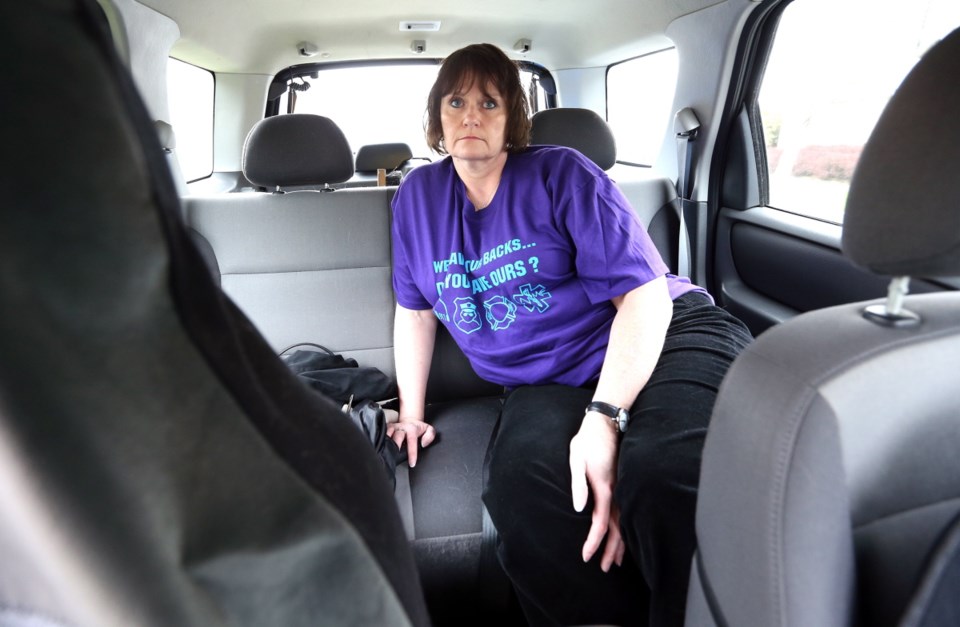Paramedic Lisa Jennings found herself living in her 2003 Ford hatchback for 10 days this year.
The car became a temporary home after she had to leave the garage she was renting with $375 of her $906 monthly B.C. disability allowance.
Times have been tough, mentally and financially, since June 24, 2014 — the day Jennings says she experienced post-traumatic stress disorder on the job. Her initial claim for compensation from WorkSafe B.C. was rejected. That decision is under appeal.
But even in dire straits, Jennings — who has since found accommodation — has not lost her drive to change B.C. legislation to make it easier for emergency first responders to have PTSD covered by WorkSafe.
In February, the B.C. legislature gave first reading to a private member’s bill, sponsored by NDP labour critic Shane Simpson, that would recognize PTSD among police, fire and ambulance members as a work-related hazard for compensation.
“Under this legislation, if a first responder is suffering from an incidence of post-traumatic stress disorder, it will be deemed to be as a result of their occupation, unless there was evidence of contrary,” Simpson said in the house.
“This will remove hurdles and ensure timely support for those public servants who need treatment.”
The bill passed unanimously, but private member’s bills rarely get past first reading.
Simpson said he has discussed the need for the change with Shirley Bond, B.C.’s minister responsible for labour, over the past year and hopes his bill adds pressure on the province to adopt such legislation on its own.
PTSD statistics show “pretty definitive evidence of a crisis” when it comes to first responders, he said.
Twelve have died by suicide so far this year, on top of 39 in 2015, according to the Heroes Are Human website, which bills itself as “Canada’s leading provider of peer-support, family assistance, and training for our public safety and military personnel dealing with operational stress and PTSD.”
Alberta and Manitoba have already passed such legislation, while Ontario is working on it, Simpson said. New Brunswick introduced compensation legislation on Friday, also spurred by a private member’s bill introduced last year.
There are also proponents in Saskatchewan, said Jennings, founder of the website You Are Not Alone PTSD B.C.
“This bill has to happen — it really is about life and death,” she said.
In a statement to the Times Colonist, Bond said that the province is “reviewing the private member’s bill put forward,” but she will await recommendations from a WorkSafe steering committee established in December to inform the province’s next steps.
The work is still in the early stages with timelines for its report currently under discussion.
Bond did not comment on legislation in other provinces but she expressed interest in the “co-ordinated national conversation” on PTSD being developed by the federal Ministry of Public Safety. She cited the need to reduce workplace stress and for research and practices that support mental health.
“We are all concerned about the health and safety of first responders and grateful for the difficult work that first responders in British Columbia do,” the statement said.
Jennings’ campaign has the support of provincial police and fire unions as well as the B.C. Government Employees Union and 55 B.C. municipalities.
Her own mental-health breakdown came after an assault while working. “My partner, my patient and I were assaulted by somebody that we would least expect to have assaulted us,” Jennings said. The incident led to suicidal thoughts and flashbacks to some of her worst calls as a paramedic.
Though several experts have said her PTSD is related to her job, WorkSafe has said her primary psychiatrist did not diagnose PTSD.
The delays have only made things worse, she said.
Even if B.C. ends up legislating the presumptive clause, it would not affect Jennings as it would not be retroactive.
But it would help first responders who, Jennings said, are re-traumatized “because they were ignored, treatment was unnecessarily denied or delayed and could no longer stand the pain of the disabling mental-health injury PTSD.”



